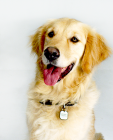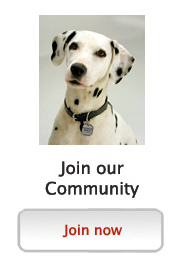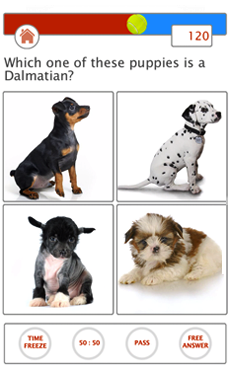Golden Retriever
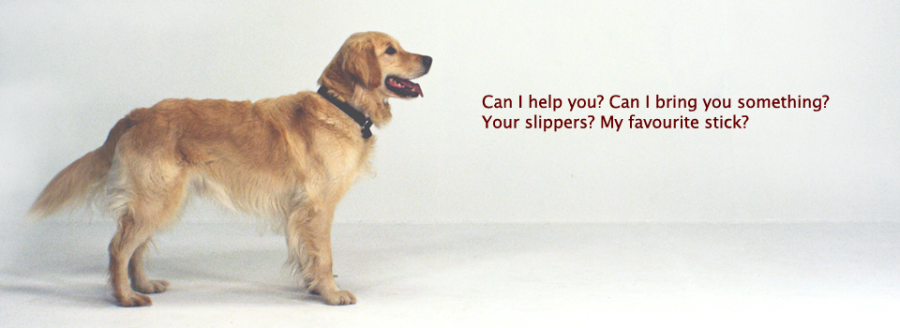
In my own words
Oh goodness, are those your shoes? Surely you need them, let me bring give to you. Or perhaps you’d prefer my freshly chewed teddy bear? Always best when nice and soggy don’t you think. I’m sorry if that was your best skirt, but I just can’t help bringing you things – it’s because I’m a gun dog you know. You should feel my mouth, soft as anything, I can hold a raw egg and not break it. That’s ‘cos I was bred to retrieve birds and no-one wants a squashed roast duck for dinner, do they? Do you know I love being helpful so much that my kind are often chosen to be guide dogs or assistance dogs. Isn’t that nice?
What’s the time? I can’t wait for the children to come home from school, I haven’t had a game allday – roll on the holidays! Can we go walkies in the meantime please? I’ll go and fetch my lead foryou. Ooh, is that somebody at the door? Hang on, let me go and get something to give them. Nowwhere did I put that shoe ...
My ideal owner(s)
Families
People who like long walks
People who like short runs
Town or country folk
People who like country pursuits
What they say about me
Handsome
Intelligent and eager to please
Gentle and loving
Playful
Please read on, to find out more about me, and whether I will be someone you can be happy withfor the next 12 years, or even longer!
Is this Golden Retriever for you?
Test your knowledge about the Golden Retriever
Information essential about the Golden Retriever
Kennel Club Group:Gun Dog
Size:Large: Weight Male 65 – 75 lb (29 – 34 kg) Female 60 – 70 lb (27 – 32 kg)Height Male 23 – 24” (58 – 61 cm) Female 60 – 70 lb (27 – 32 kg)
Popularity:
Golden Retrievers are loved by everyone. They are the eighth most popular dog in the UK, and fifth most popular in the United States and Australia. US President Gerald Ford had a Golden called Liberty, and Goldens have been captured the hearts of movie audiences all over the world.
Breed History:
The Golden Retriever’s roots are Scottish. During the mid 18th Century, wildfowl hunting became very popular among the rich. Scotland is covered in lakes, tarns and rivers, so a dog was needed which could retrieve from both land and water. The improvement in firearm capability soon meant that birds were being downed (and lost) at greater distances from the guns, and over very difficult terrain. Even the best setters and retrievers of the day were not up to the job. A specialist was required.
Early retrievers were crossed with the best water spaniels, eventually giving rise to the Golden Retriever we know today. The breed was developed largely by Sir Dudley Marjoriebanks (later Baron Tweedmouth) on his Scottish estate. Golden Retrievers were first registered with the British Kennel Club in 1903 as Flat Coats – Golden, then in 1913, the Golden Retriever Club was formed, and the breed was finally registered as the Golden Retriever in 1920. The United States stole a slight march on Great Britain by first registering the Golden Retriever with the American Kennel Club in 1894. Canada first registered the breed in 1927.
Because of the specialisation of their retrieving skills and willingness to please, Golden Retrievers are unsurpassed at this work, which also makes them excellent Guide Dogs and Assistance Dogs as well as ideal all-round family pets.
Character:
Your Golden Retriever ranks fourth in Stanley Coren’s book “The Intelligence of Dogs”, behind Border Collies, Poodles and German Shepherds for obedience command training. A mature Golden Retriever is active and fun loving, and their ability to sit quietly for hours in a hide when hunting has the happy side effect of making them exceptionally patient with children. Your Golden Retriever loves to work, but be warned because they don’t know when to stop, and can become exhausted, so take care not to let yours overdo it. Their size and agility gives them the ability to scramble in and out of boats (as well as over garden fences after that rabbit) and because of their hunting genes, they adore water and swimming. Brilliant in obedience trials and agility contests, your Golden Retriever responds well to positive, reward based training. Harsh methods do not work with these dogs, as they are very sensitive. Bitches make excellent surrogate mothers, and some have been known to nurse kittens, and even tiger cubs at zoos, producing milk despite not being recently pregnant or nursing. Your Golden Retriever loves everybody – you, your friends, your children, your other pets, other people’s pets. If it moves and breathes, it will be your Golden Retriever’s friend.
Temperament:
The Steve Stills song “Love The One You’re With” could have been written for Golden Retrievers.
They just love everybody, which is what makes them such ideal family dogs. Active, clever, and confident if treated positively, your Golden will happily join in any activity you like, from beach cricket to Flyball, from hunting to hiking. Your Golden is a sensitive soul though, and gets very upset if there is any disharmony in the home. He isn’t aggressive, territorial, jealous or destructive, though, like the Labrador Retriever, he can be a bit hyper when a puppy. They do grow out of it though, promise! Meanwhile, keep your Golden busy running, swimming, playing ball, fetching sticks and letting him get deliciously wet and muddy. Goldens love to carry things around, sometimes a favourite object will be carted around for days until it is a soggy, filthy mess. Your Golden will not be the best of guard dogs, apart from the occasional “woof” he will be the welcoming party to anyone coming to your door.
Conformation:
There are three types of Golden Retriever, the British, the American and the Canadian.
A good British Golden Retriever should look balanced and well proportioned. The head should be broad with a wide, slightly tapered muzzle, a brown nose, gentle, round brown eyes and medium sized, softly pendant ears. The neck should be sturdy and the chest broad, the back level and the legs strong. The long tail should be straight. The dense, water-resistant coat can be flat, wavy or feathered. The American type is taller and less stocky than the British type, with a narrower muzzle, more sloping forehead, and longer legs. The back often shows a slight rear angulation unlike the straight backed Brit. The American type has eyes which are more almond shaped or triangular than the round eyes of the British type. The Canadian Golden, like the American, is lankier than the British, but the coat tends to be thinner and darker than both other types. All three should show a free-moving, graceful and well co-ordinated gait.
Colour:
The coat can be any shade from soft pale cream to a rich red gold. Dogs from a working line tend to be darker than those bred for showing.
Training:
Golden Retrievers are naturally obedient and willing to please, as well as being among the most intelligent of all the breeds, so training should be problem free. As long as his schooling is done in a positive, reward based way, with no harsh methods used, he will learn anything you choose to teach him. Puppies can be boisterous, and it is therefore sensible to begin basic training early on.
Care:
Goldens shed all the year round, with “bursts” of shedding in Spring and Autumn (Fall). Regular brushing every week, and daily during those extra shedding periods, and a bath every couple of months will keep your Golden’s coat in tip top condition. If you notice extreme shedding that leaves bald patches, this may indicate that your dog is not well, and a check up with the vet is recommended.
Health:
The lifespan of a healthy individual is between 10 and 12 years, which is normal for a dog of this size. However, some live for as long as 14 years. If you buy from a reputable, responsible breeder, health problems should not occur. However, if your Golden does achieve a good old age, the normal complaints that we all suffer from, such as arthritis and failing eyesight may begin to develop.
Common diseases include cancer, heart disease, cataracts and glaucoma. Hip and elbow dysplasia can also occur, and it is a good idea to get your puppy hip and elbow scored if you are thinking of breeding later on. Other problems can include patella luxation, where the kneecap slips in and out of place, arthritis and cruciate ligament rupture. When your Golden puppy is young, many of these joint problems can be avoided by exercising for short periods only and avoiding too much rushing around until the bones are strong enough to take more strenuous exercise, after around 18 months.
Goldens have sensitive skins and allergies, especially to flea bites are common, causing dermatitis. Haemophilia is rare, but does occur in Goldens. However, if you are careful who you buy from, your Golden Retriever should give you many years of good health, fun and loving companionship.
You may also like:
Golden Retrievers and their owners »



If you like Golden Retrievers, you may be interested in breeds of the same size »
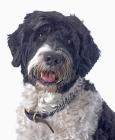
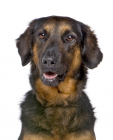
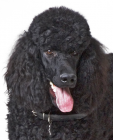
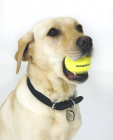

If you like Golden Retrievers, you may like other breeds with similar characteristics »

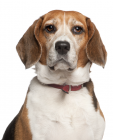
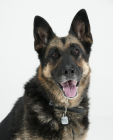
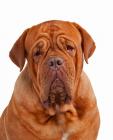
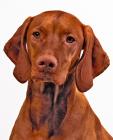
If you like Golden Retrievers, you may be interested in these other Gun Dog dogs »
Advice on choosing your breed »
Find an animal shelter or rescue home where a Golden Retriever is waiting for a new home »
IS A GOLDEN RETRIEVER THE RIGHT DOG FOR YOU? A SHORTHAND GUIDEThe following grid gives a fast track review which covers all breeds. You can apply it to help you decide if a Golden Retriever is suitable for you, the environment where you live, your personality and your lifestyle. On the grid, 1= strongly disagree, and 5= strongly agree. For example, if you are looking for a dog that likes to swim, look down the list under Activities, and you will see that Goldens love water and are strong swimmers, scoring 5. If you want a playful companion, look down the same list, and you will see that Goldens love to fetch and hunt, and score 5. You might like to save or print off this section and keep it for reference while you check some other breeds before making your final choice.
Add your own ratings on this breed »
|
*PLEASE NOTE: All our breed profiles are general, and all dogs are individuals. Always talk to the breeders and meet the owners you are buying from. Try to meet the dog and its parents if it is a puppy in their home environment.








